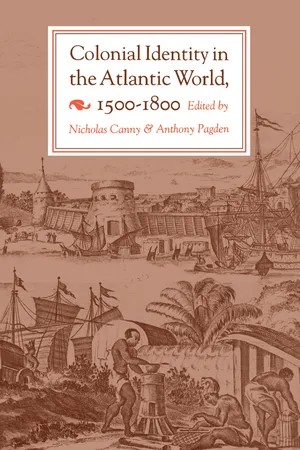
This is a test
- English
- PDF
- Available on iOS & Android
eBook - PDF
Colonial Identity in the Atlantic World, 1500-1800
Book details
Book preview
Table of contents
Citations
About This Book
The description for this book, Colonial Identity in the Atlantic World, 1500-1800, will be forthcoming.
Frequently asked questions
At the moment all of our mobile-responsive ePub books are available to download via the app. Most of our PDFs are also available to download and we're working on making the final remaining ones downloadable now. Learn more here.
Both plans give you full access to the library and all of Perlego’s features. The only differences are the price and subscription period: With the annual plan you’ll save around 30% compared to 12 months on the monthly plan.
We are an online textbook subscription service, where you can get access to an entire online library for less than the price of a single book per month. With over 1 million books across 1000+ topics, we’ve got you covered! Learn more here.
Look out for the read-aloud symbol on your next book to see if you can listen to it. The read-aloud tool reads text aloud for you, highlighting the text as it is being read. You can pause it, speed it up and slow it down. Learn more here.
Yes, you can access Colonial Identity in the Atlantic World, 1500-1800 by Nicholas Canny, Anthony Pagden in PDF and/or ePUB format, as well as other popular books in Historia & Historia americana temprana. We have over one million books available in our catalogue for you to explore.
Information
Topic
HistoriaSubtopic
Historia americana tempranaCOLONIAL
IDENTITY
IN
THE
ATLANTIC
WORLD
The
very
absence
of
discussion
of
major
issues
like
these
is
an
indication
of
the
pioneering
quality
of
these
essays.
All
too
often
where
they
fall
silent
it
is
because
the
research
has
never
been
done.
But
they
perform
the
great
service
of
bringing
on
to
center
stage
the
fascinating
question
of
self-image
in
the
infinitely
complicated
history
of
the
triangular
relationship
of
mother
country,
colonists,
and
subject
populations
during
the
age
of
Atlan-
tic
colonization
and
settlement.
In
this
period,
"holding
on"
and
"breaking
away"
were
for
a
long
time
half-options
in
which
profit
and
loss,
hope
and
disillusionment,
interest
and
risk
endlessly
counterbalanced
each
other
in
uneasy
equilibrium.
In
some
of
these
societies
there
were
conspiracies
and
rebellions—however
unsuccessful—against
the
dominance
of
the
mother
country.
In
others
there
were
not.
"Breaking
away"
had
first
to
be
thought
before
it
could
happen,
and
the
unthinkable
would
not
have
become
think-
able
without
a
prior
process
of
self-definition.
It
is
this
process
of
self-defi-
nition,
sometimes
advancing,
sometimes
regressing,
but
never
static,
that
the
contributors
have
sought
to
analyze.
13
Table of contents
- Cover Page
- Half-title Page
- Title Page
- Copyright Page
- Dedication Page
- Contents
- Acknowledgments
- List of Contributors
- 1. Introduction: Colonial Identity in the Atlantic World
- 2. The Formation of a Colonial Identity in Brazil
- 3. Identity Formation in Spanish America
- 4. Nouvelle-France / Quebec / Canada: A World of Limited Identities
- 5. Identity in British America: Unease in Eden
- 6. Identity Formation in Ireland: The Emergence of the Anglo-Irish
- 7. Changing Identity in the British Caribbean: Barbados as a Case Study
- 8. Afterword: From Identity to Independence Canny
- Index